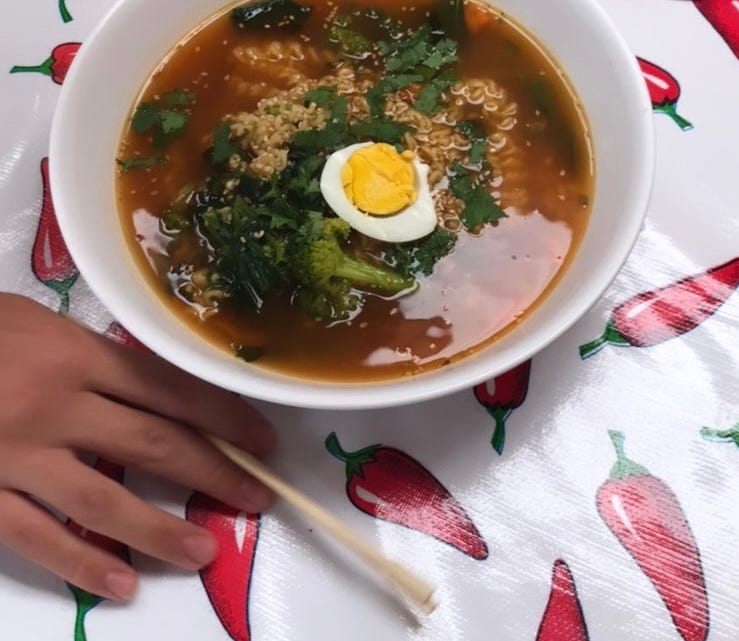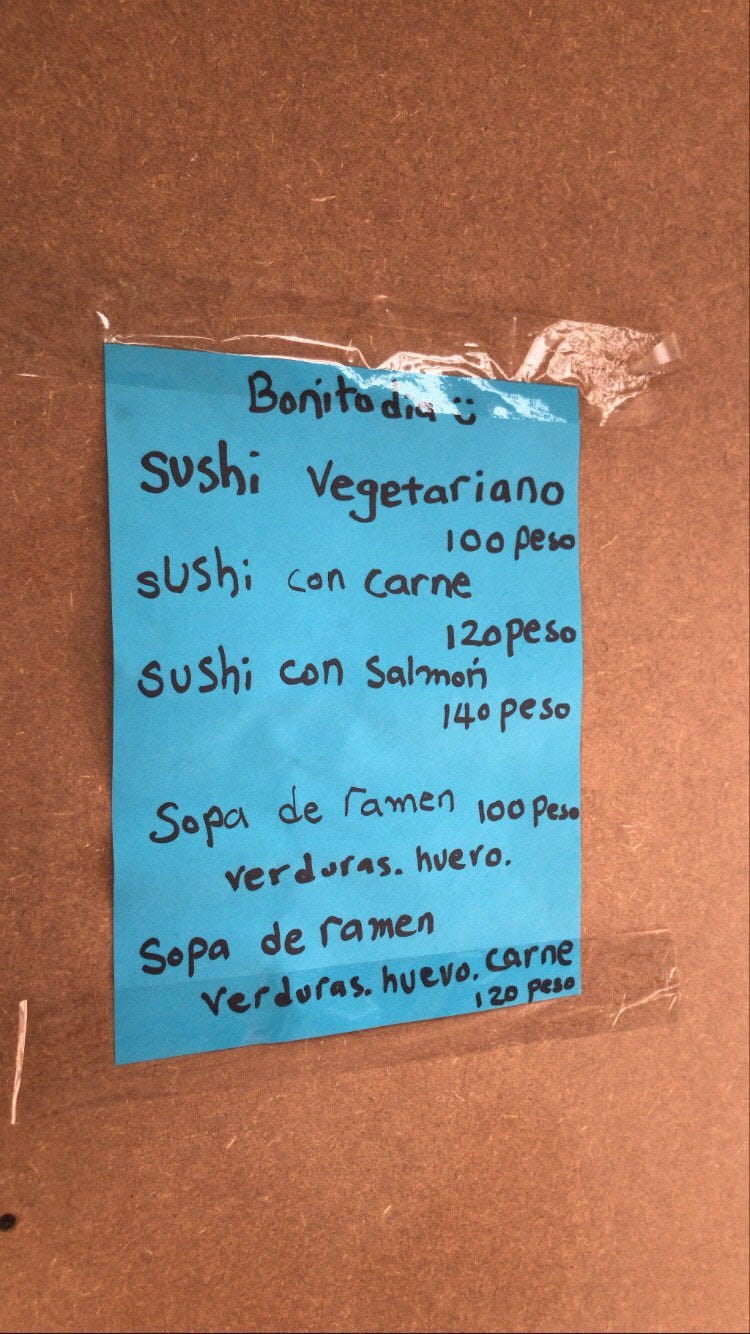I’ve been holding this story close for a few years. To me, it’s the proof that solo travel is a type of adventure meditation (more on this in a future post). I tell myself to say “YES” to everything unless I can articulate a solid reason for the “NO” and this way of of living invites chaos and beauty in equal measure. I’ll take the chaos if I can live in the beauty 100%.
Whenever I’m in Oaxaca I make a point of visiting Ms. Park (I’ve changed her name for the story). I came upon her 3-table restaurant while trying to visit Francisco Toldedo’s workshop in a town about 1 hour outside of Oaxaca Centro. I nearly leapt out of a moving cab when I saw a tiny Korean restaurant on the side of a Oaxacan mountain. While in Mexico City there’s no shortage of Asians, it’s pretty notable when you clock another Asian person in Oaxaca. Further, a Korean person rooting down in Oaxaca has to be a story.
Meeting Ms. Park felt like a cosmic nudge reminding me that these stories matter — stories of aberrant Korean diaspora, stories about generational renegades from a country that was progressing too fast to make room for the weirdos, the stories that give nuance to an endlessly complicated narrative of diaspora.
1.22 Oaxaca, Mexico
I go back to Etla in search of Ms. Park again. I promised I’d visit the day after next when she asked if we’d see each other again and while I’m apt and likely to change plans, this promise, it sticks. In my stupidity I assumed if I told the cab driver to take me to St Agustín de Etla I would see the restaurant on the way. But of course there are multiple ways to any one place and we reach Centro de les Artes de St Agustín without passing the sign for “Comida Coreana”. I am happy for an excuse to visit Francisco Toledo’s paper workshop which was closed on my last visit and not wanting to trouble the cab driver with my terrible Spanish, I cross my fingers and hope she drives down the mountain another way.
We reach the base of Vista Hermosa and I’ve already told myself to leave it to fate. There is, after all, a little romance in encountering a thing only once. It seems to me, Ms. Park could have been a ghost. Then by chance the cab driver stops and asks if I’d like to buy some water before making our way back to Centro. I say, no need for me and then pause at the opportunity, her willingness to break. I fumble out my phone to bring up a photo of the restaurant, point back up the direction of Vista Hermosa. I’ve already attempted Googling the establishment but as it’s difficult to map and has only been open for two weeks, it’s an unlikely find for even the internet gods.
The cab driver takes my phone to the nearest convenience store and shows the photo of the restaurant to the cashier and even from the car I can see it’s a no-go. But I’m quickly starting to adore Monica, the driver, and I can tell she’s game. We decide to look for the restaurant together. With two fingers pointing out like a gaze, she signals that she’ll drive slow so we can keep an eye out. We pass by a children’s school being painted and ask a man painting the word “JARDIN” in thick black strokes if he knows of a Korean restaurant in the area. Without breaking from the work he shrugs but tells us to try this direction, pointing to where we came from.
We pass a young couple with a small daughter and also ask if they know of a Korean restaurant in the vicinity. I note the tattoo circling the mother’s thigh, her beautiful face. There are many words being exchanged, none that I recognize but they seem to indicate general confusion. Again, I wonder, did I dream this encounter? Finally Monica shrugs as if saying, “Well, we tried.” “Listo?” “Si”, I reply and we drive back down the mountain, still slow and looking. We are about 5 minutes from the base and I see the rainbow streamers, that particular saturated blue and red which I suppose could be the patriotic colors of any number of countries but in this case, seem so Korean to me. I say, “Aqui!” and Monica seems almost as excited as I am.
Ms. Park is surprised to see me and she marvels at the timing. She was about to close up shop because she could feel a sickness coming on and as there were no customers, thought to call it a day a little early. I say she should rest if she’s feeling ill–I only wanted to say Happy Lunar New Year and bring her some kimchi from Suculenta and a bundle of cranberry beans I bought at the market. She is happy to see me, she says please stay. She’s forgotten the New Year and says, “That’s right, it is!” She invites me to have dinner at her house and I say I can’t because Monica is waiting though mostly I don’t want to impose.
Her teenage old son is making us instant ramen. She tells him to make the “naranja” one and turns to me saying, “Right, you don’t like things too spicy?” I have no idea why she assumes this but it’s true in this case. As we sit down she gets a phone order for kimbap and she tells me, let’s keep talking as she cooks, so I follow her into the kitchen. The kitchen is maybe 5’ wide and 2’ deep. It has a small counter for making kimbap, a wood cutting board, a 4-burner propane stove, and a microwave. I look for a rice cooker but instead she takes pre-cooked rice out of a container and puts it in the microwave. She tells her son to heat it up for exactly one minute. On my last visit she told me of his autism, how as a mother it is her primary concern. In part, she opened up this business because of his autism, because this is a living she believes she can teach him. She seems to indicate the possibility of something unpredictable happening – either her health or his.
The microwave dings ready and she puts the hot rice on an enameled tray, adding sesame seeds and more rice, perhaps to dull the heat. She is mixing the rice by hand, keeping an eye on the ramen as she tells her son to put on another pot. I can smell that the ramen is ready and her son brings out a wide rimmed bowl, wordlessly asking if it’s time. She nods and he pours the noodles with the broth. She adds sesame seeds, cilantro, spinach, carrots, and broccoli. All the vegetables have been pre-blanched and the carrots have no distinct edge, soft and shapeless. Before her son puts the ramen down on the table she quickly grabs a halved hard boiled egg as a last garnish and says from behind a curtain that she knows Koreans like a fresh cracked egg cooked directly in the soup but she thinks that looks messy and Mexicans prefer it this way in any case. She laughs and says it’s “냉면-style”. Immediately I wonder what foods she misses the most and how long it’s been since she’s eaten such things. All she can get here is seaweed, sesame oil, soy sauce, and rice. What she craves the most is 냉면 and I think to myself, I’d be the same. There is no other flavor like 냉면 and I’m instantly craving briney sour beef broth, a slice of sweet pear. Of all the things, this makes my heart ache the most–a constant longing that never alleviates despite the bigness of her life, despite the 자유 (freedom) she claims.
자유 (freedom) becomes the theme of our conversation. Freedom is an abstraction, maintained with pain. We feel this both. She says, “Few people know how hard it is to be free, how hard it is to keep free...” We spark in recognition. We both tear up in this exchange and she says my eyes are already open in this way so perhaps I can see. I am not sure what I am seeing but my eyes are very open.
She is undeniably beautiful, black liner only on her bottom lid. Her complexion is dark and tan, weathered with good life. She is certainly younger than my mother, her skin has been blessed by sun and genetics and I imagine her as a surfer and think about the exponential versions of her life. Her hair is long and most of her white hair is aggregated towards the crown of her head. She says she used to have long hair like mine but cut it recently. She seems sad about this but I can’t imagine her more beautiful than she is now. She is still thin, still wearing the body of a dancer – tall and lithe. She must have been an unusual beauty in her youth. She pulls at her eyelids saying that in her time no one had natural ssangapul (double eyelids) like hers, how no one thought she looked Korean, as if even her own face had betrayed her, fated her for something else.
I ask what was hard about Korea, why she left and she explains the rigidity, the impossibility of being an outlier in a homogenous sea. It’s been decades since she’s touched Korean ground and her memory is cemented deep in a different time from a fast moving country. What she remembers is judgment, limitation, the drive of capitalism and greed. She uses the word 질투, jealousy, to describe a Korean sentiment. She keeps repeating that she never understood why Koreans are the way they are, why they can only see one way. I try to say it’s a little different now, more open, more permissive but also this feels like a kind of lie because even my own family holds this rigidity. To find value in my own life is to disengage from the gaze of the people I love the most. It takes obstinance, it takes a small measure of cruelty.
I ask her about her parents. Don’t they worry? She says of course, they are her parents, how could they not? She has younger brothers who did all the things they were supposed to do–they married, they had children, they stayed put. They didn’t understand her when she left Korea to study dance in India. They thought she was crazy when instead of going back, she let her visa expire and moved onto Hungary and then Italy and then found herself in Mexico where she says she stepped off the plane for the first time and felt she had been many times before. They ask why she lives this way. She has been rich, she has been poor, she has owned things and then let them go. Everything she does seems to spark new controversy in the family, so much so that she has found it easier to just stay away. Her face still pains when she talks of how angry they were at her divorce. They never liked her husband anyway.
She says the only regret she has had is marrying an Italian man with a bad temper. She says to marry was her 실수, it was her mistake. I shift uncomfortably at her ownership of the error. Why do so many women do this? I see her eyes move to my left hand as she looks for a wedding ring before saying, “No one gets married anymore, do they? Even my daughter has no interest.” This has not been my experience but I indulge it anyhow and agree yes, no one gets married anymore.
She tried leaving her husband many times. She fell in love, suddenly, beautifully and then she saw his temper flare and knew it was a lie. I ask, “How could you have made such a mistake?” and am immediately embarrassed by my question but also I want to know. When she finally did leave him, he took all her money, emptied their accounts. He burned her clothes thinking she’d have to come back to him, homeless and without anything but the two children they made together. They were married 13 years. Her son is still scared of his father and while they are in contact the meetings are obligatory and uncomfortable for all. Her daughter, 23, sells Korean make-up in Oaxaca Centro and seems to have a somewhat more peaceful relationship with her father. Again, we are crying. No one gets married anymore.
Despite all of this she says she is a person with much luck in her life. She puts one foot in front of the other and somehow always finds ground. Immediately I think of my mother and how she would look at Ms. Park and say this woman has no luck. But she exclaims again, “I mean, I opened this place with 74 pesos. That is luck!”
I am nervous that I am taking up too much time and space, minding her delicate health. She says please come again, that it feels so good to speak Korean and I promise that when I am in Oaxaca next I will certainly come and visit. She says she’ll let me take her portrait then. Today she is not feeling well. I tuck 500 pesos under my now empty bowl of ramen. I am not even hungry but some kind of childish obedience comes over me and I eat until it hurts, I drink all my soup. I don’t want to make a fuss and so am trying to exit before I overstay my welcome. I wish her a happy new year and gather my bag to go. She asks her son to say goodbye to me in Korean but I don’t hear him say the words because I’m already crossing the street not wanting to show my feelings.








Saehee <3 THIS is the kind of story I want to be reading and I want the world to be hearing!